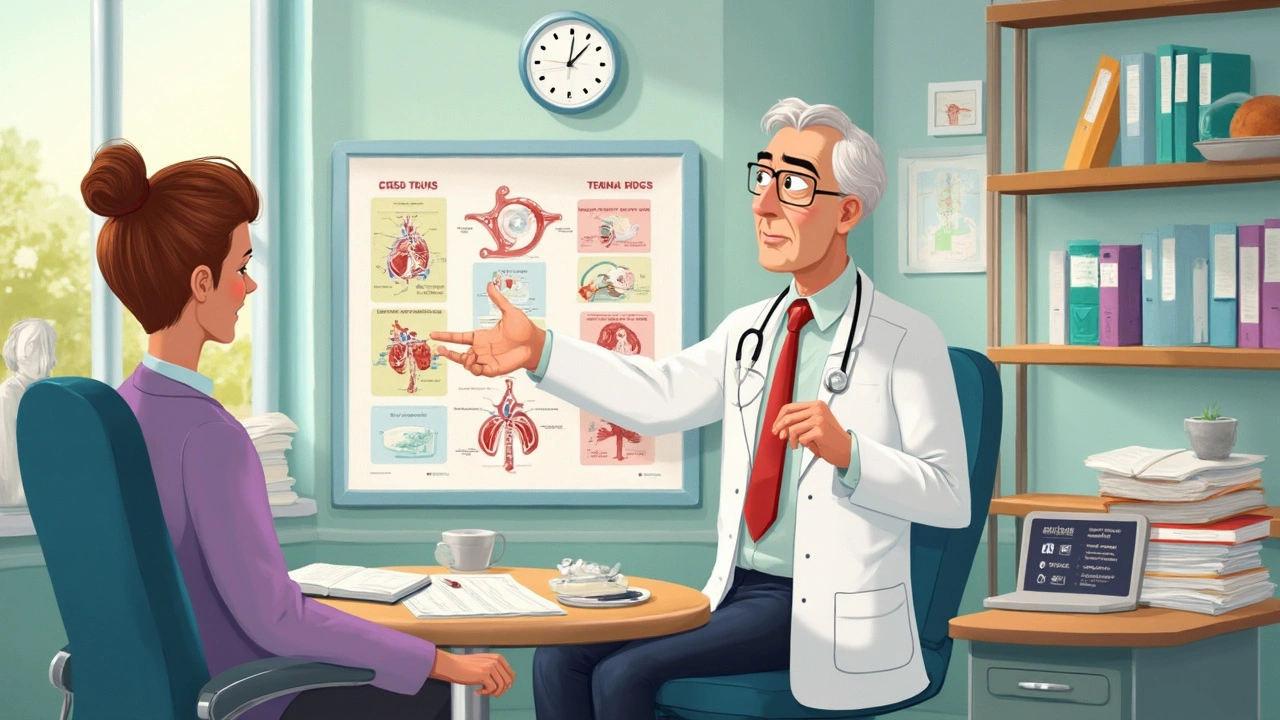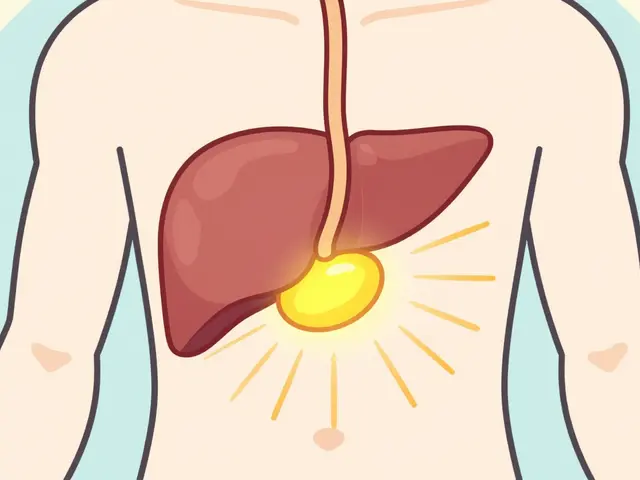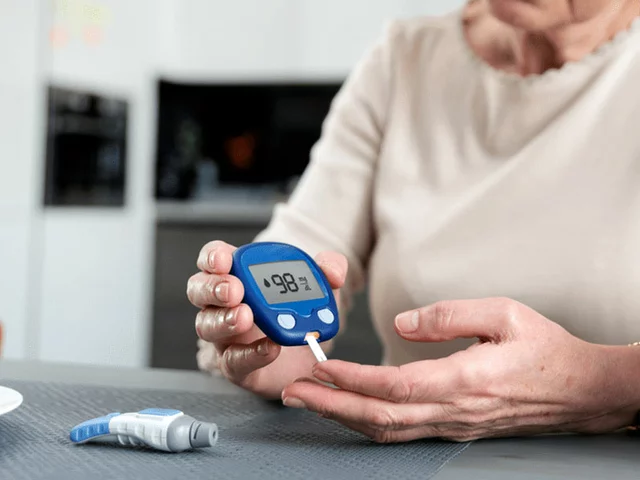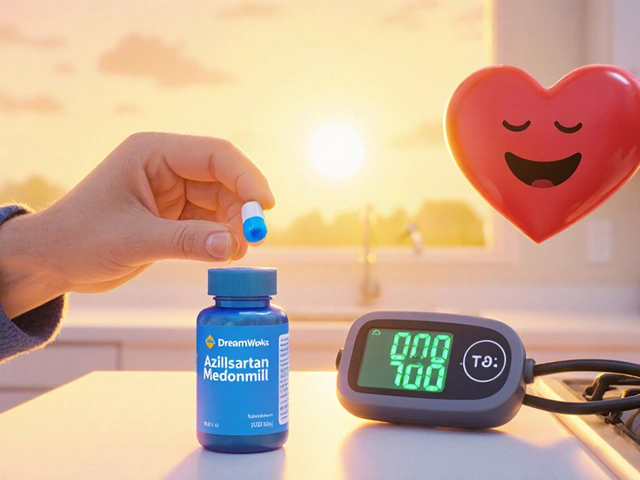
How Nitrate Medications Work in the Body
If you’ve ever heard of nitroglycerin, you know it’s more than something from an action movie—it’s actually one of the classic nitrate medications used for people with heart problems. These drugs have a single job: widen your blood vessels. Sounds simple, right? Here’s why that’s so important. When you have narrowed arteries from conditions like angina or heart failure, your heart isn’t getting enough oxygen. It makes your heart work overtime, and not in a good way. Nitrates open up those passages, making blood flow better and reducing the heart’s workload. Think of it like clearing out a clogged drain—you suddenly get a smoother, faster flow.
Nitrates come in several different forms: tablets that melt under the tongue (sublingual), patches you stick on your skin, sprays you spritz under your tongue, and slow-release pills like isosorbide mononitrate. Each option does the same basic thing—relaxes your blood vessels, especially those leading to your heart—but with different timing. Sublingual tablets act fast, great for sudden chest pain. Patches and long-acting meds are more like a shield, helping prevent those pains from showing up in the first place.
The actual science is pretty wild. Once in your system, nitrates release nitric oxide—a natural chemical that tells your muscles in the blood vessel walls to chill out. This relaxation lowers your blood pressure and makes it easier for your heart to pump blood. Studies show that regular nitrate use can increase how much you can exercise, reduce chest pain attacks, and even help people with severe heart failure live more comfortably.
But here’s something most people don’t realize: your body gets used to nitrates if you take them all the time. It’s called “nitrate tolerance”—sort of like how caffeine stops working if you slam too much coffee every day. That’s why doctors suggest having a daily “nitrate-free interval,” usually overnight, to keep the drugs working well. Without this break, the blood vessel-relaxing effects start to fade, and your symptoms might return. So, skipping the break or popping extra doses isn’t a good idea.
Curious about who really needs these meds? People with coronary artery disease use them to cut the risk of angina (that crushing chest pain). They’re also used during and after heart attacks, and even in treating heart failure if other meds aren’t doing the trick. And get this: millions of people around the world take long-acting nitrates. According to recent prescription data, isosorbide mononitrate—one of the main long-term options—remains in the Top 100 most prescribed heart drugs in the US and Europe.
If you’re wondering about immediate side effects, dizziness and headaches top the list. Ever had one of those pounding headaches after starting a nitrate med? It’s super common, especially in the first week. Headaches usually get better with time, but it’s smart to mention them to your doctor if they drag on. Some folks also notice flushed skin or a racing heartbeat, signs your body’s vessels are, in fact, opening up.
What Does Long-Term Nitrate Use Look Like?
Taking nitrate medications for months or even years isn’t unusual for people with chronic heart conditions. So, what happens as time ticks on? Most people tolerate these meds surprisingly well, but the story gets a bit more tangled the longer you take them. One of the trickiest issues is that tolerance we mentioned before. Almost everyone taking nitrates every day experiences some decrease in effect over time. That’s why it’s so important to follow your dosing schedule—doctors adjust what time you take your pills and patches to trick your body and keep the drugs effective.
There are some risks specific to the long haul. For instance, the famous “Monday disease” describes headaches and feeling groggy workers experienced when they’d start handling nitroglycerin again after a weekend off. In everyday medical use, these symptoms pop up when there’s a change in your medication pattern. So if you change brands, miss doses, or suddenly stop nitrates, you might feel rebound angina or a spike in symptoms. Consistency is everything here.
What about side effects down the road? The most common complaints don’t really change: headaches, dizziness, and extra flushing. But at higher doses or over longer periods, you could run into low blood pressure—especially if you stand up too quickly or get overheated. A recent clinical review found that about 1 in 7 people on long-term nitrates reports fainting or severe light-headedness at least once. Staying hydrated and getting up slowly helps reduce this.
There’s also a conversation happening around long-term effects of isosorbide mononitrate. Some people worry about more rare side effects—think anemia from blood changes, or chronic headaches that won’t quit. Most research says the real risk of organ damage or long-term harm is low, but there’s clearly more to learn as new data comes out. If you notice anything that feels off—especially new chest pain, fainting, or severe weakness—you need to check in with your provider immediately.
Taking other meds with nitrates can be a surprise. Certain drugs, especially those for erectile dysfunction (like sildenafil), can cause dangerous drops in blood pressure if combined with nitrates. Always mention all your meds to your doctor, even the ones that “don’t seem related” at first glance.
One real-life tip: it helps to keep a symptom diary. Jot down when you take your meds, any chest pain, headaches, or weird feelings. Bring that to your regular checkups and it makes spotting trends way easier for your care team. Plus, if your meds ever change, you know right away what’s normal for you and what’s new.

Keeping Safe: Why Ongoing Monitoring Matters
People might assume that once they start long-term nitrate use, it’s set-and-forget. Not quite. Your needs and your body change over time—it’s part of life, and it’s absolutely true for anyone living with heart disease. That’s why doctor check-ins are non-negotiable. Even if you feel fine, your provider will check your blood pressure, heart rate, and see how effective the medication is for your symptoms. This isn’t just a box-ticking exercise—it’s to spot problems like declining kidney health, anemia, or new side effects early.
Lab tests may be part of the picture. For some patients, routine blood work can help rule out less common complications. You probably won’t need scans or stress tests every year, but your provider will want updates if anything in your medical life changes—new diagnosis, new symptoms, or new medications.
Let’s talk numbers for a second. Studies suggest that regular medical follow-up cuts risk of emergency room visits by up to 40% for chronic heart patients, including those on nitrates. That doesn’t mean you need to crowd your calendar with appointments, but showing up and sharing accurate info really does impact your outcomes.
Sometimes, you might need an adjustment. If you pick up a new exercise routine, drop weight, or add new meds, the dose you started with might not be right anymore. Your doctor can readjust your plan so you’re always getting the most bang for your buck—without extra side effects.
A quick word on self-monitoring. Blood pressure cuffs you use at home are more reliable than ever, and tracking your own numbers in between appointments helps catch dips and spikes early. Some patients even use smartphone apps that sync with these devices, which can log trends over weeks and months. If you see anything really out of the norm, ring your provider before changing your pills or patch schedule.
Missing doses happens—nobody’s perfect. But the risk isn’t just a return of chest pain; if you’ve skipped several doses, it can cause serious rebound symptoms that can even land you in the hospital. If in doubt, never double-dose to "catch up." Instead, take your next scheduled dose and call your care team for advice. They’ve seen it all, and will guide you safely.
Practical Tips for Patients Using Nitrate Medications Long-Term
Long-term nitrate medication use is absolutely doable, but a few daily habits make things a lot smoother. First, stay consistent with your schedule. Whether you use a phone alarm, weekly pill organizer, or put your reminder sticky on the bathroom mirror, taking your meds at the same time every day helps prevent slips.
For patches and slow-release tablets, check your skin or pill for changes. Sweating a lot or showering right after you put on a patch? That weakens its stick and its effect. Try to pick a dry spot and switch it up daily to let your skin recover—no one likes irritation. If your patch falls off early, check with your doctor about what to do next.
Headaches are kind of a rite of passage with nitrates, especially at the start. Simple tricks can help: drink enough water, avoid skipping meals, and steer clear of bright sunlight or heavy exercise in the first few days after starting or increasing your dose. If headaches get brutal, stash a mild pain reliever your provider okays—just steer clear of NSAIDs (like ibuprofen) unless told otherwise, since they can mess with heart medications.
Make sure your friends, family, or co-workers know you’re taking nitrates, especially if you have a heart condition. If you faint or look unwell, they should know to tell emergency responders about your medication.
Alcohol, hot tubs, and saunas—a weird trio, but all of them can supercharge the blood-pressure-lowering effect of nitrates. If you’re sensitive, go slow with alcohol and avoid prolonged heating after you pop your pill or slap on your patch. Some patients record a record low blood pressure after a night out with a couple of drinks, so pay attention to how your body responds.
Sometimes your prescription will look different when you get a refill—different shape, color, or brand. Always double-check with your pharmacist if something changes, especially if you notice new side effects. Pharmacies occasionally switch suppliers, and while the active ingredient is the same, fillers and coatings can sometimes cause new reactions.
| Common Side Effects (Nitrates, Long-Term) | Frequency |
|---|---|
| Headache | Up to 50% |
| Dizziness | About 33% |
| Lightheadedness when standing | Up to 14% |
| Flushing | About 10% |
For those worried about tolerance, ideally use the "nitrate-free interval" to your advantage. Nighttime dosing patterns are one of the best ways to give your receptors a break and keep your meds effective. If your symptoms keep showing up during these nitrate-free times, talk to your doctor right away.
Finally, always keep an emergency nitroglycerin tablet or spray with you if prescribed—it can mean the difference in a true emergency. And check the expiration date every few months. These tiny pills lose strength if stored in heat or sunlight, so hide extras in a cool, dry spot (but not the freezer).
Managing a chronic heart condition is a marathon, not a sprint. People who get involved in their care—tracking meds, staying in touch with doctors, and reporting changes—typically do better in the long run. You’re not just taking pills; you’re working with your care team to live as fully as possible, with fewer surprises.
11 Comments
Tony Halstead
July 20, 2025 AT 16:40 PM
The intricate dance between the chemical action of nitrates and their physiological impact has always fascinated me. This article did a commendable job articulating why long-term use isn't just a simple solution but a nuanced medical journey.
Beyond the clinical explanations, the piece rightly underscores continuous surveillance — a theme echoing the broader philosophical notion that balance in medicine mirrors balance in life.
A question arises naturally: how might evolving treatments or adjunct therapies influence the reliance on nitrates moving forward? That could be an enlightening follow-up discussion.
All in all, a thorough and thoughtful exposition that invites both patients and caregivers to engage more deeply with their heart health management.
Erin Knight
July 21, 2025 AT 12:40 PM
Honestly, this article scratches the surface but tends to pontificate rather than get to the gritty truth about nitrates long-term. It dances around the complications with this pretentious veil that doesn't empower the average patient.
I mean, sure, the pharmacodynamics are cool and all, but the takeaways should be much more pragmatic and less like a medical lecture.
People dealing with these meds every day don’t need fluff, they need bold, clear warnings and guidance without sounding like a textbook.
That said, I do appreciate some of the colorful insights here, but really it could be sharper and less riddled with cautious jargon.
Anyone else feel this article tries way too hard to sound fancy?
leo dwi putra
July 23, 2025 AT 16:40 PM
Okay, but! Can we talk about all the side effects they barely glossed over? Like, who wants to be taking meds that give you headaches, dizziness, and other funky effects for life? Not me!
This nitrate thing sounds like a wild ride, and the article kind of skimmed the drama of what patients actually feel on the daily.
Sometimes the real challenge is not just the heart, but dealing with the meds that make life a little harder.
Obviously, safety and monitoring is key, but do doctors just get tired of hearing complaints about side effects? Because that stuff is REAL.
TRICIA TUCKER
July 25, 2025 AT 23:20 PM
Just want to say how refreshing it is to see an article that includes caregivers in the conversation! So often it's all about the patient, but the support system around them is crucial too.
Managing someone’s nitrate meds can be complicated, especially with the potential for side effects and the need for constant vigilance.
The practical tips shared here might just be the lifeline many caregivers need to feel more confident and informed.
I also appreciate the informal touches in the advice—it makes it less scary to approach doctors and ask the right questions.
Anyone else here a caregiver who's juggling this stuff and wants to share their experience?
Kimberly Newell
July 28, 2025 AT 06:00 AM
hey i found this article pretty easy to understand even for ppl who are not into medical stuff lol. nitrates have a kinda weird rep but knowing that u gotta keep those doctor visits up is super important.
i always wondered why meds have to be mixed with so much monitoring but now it makes more sense — it’s like checking in on a plant u gotta water just right, not too much or too little.
thanks for the practical advice this piece gave. makes me feel a little less scared for friends on these kinds of meds.
hope there’s more stuff like this that keeps it real but simpleicized.
Jacob Hamblin
July 30, 2025 AT 20:20 PM
The article’s emphasis on regular doctor visits is no mere suggestion; it’s a medical imperative. Nitrates affect vascular dynamics in complex ways that vary per individual, demanding close professional oversight.
What’s striking is the detailed explanation of nitrate tolerance mechanisms — an aspect many patients overlook until efficacy fades.
Moreover, monitoring isn’t just for dosing adjustment but for pre-empting potential adverse side effects that can undermine treatment success.
Patients and caregivers alike should see this as a collaborative partnership with healthcare providers rather than a passive regimen.
Drew Burgy
August 2, 2025 AT 17:00 PM
Oh sure, regular monitoring sounds good until you realize the pharmaceutical-industrial complex has a vested interest in keeping folks on drugs forever, am I right? This whole nitrate monitoring routine reeks of Big Pharma control.
What if these "side effects" and "complications" are exaggerated to keep patients locked in a never-ending cycle of appointments and prescriptions?
Not saying nitrates are evil, but the narrative is definitely worth skeptical examination.
Nevertheless, the science presented is interesting, but I’ll be taking it with a grain of salt. Who else here thinks we should demand more transparency from healthcare about long-term drug use?
Alexia Rozendo
August 4, 2025 AT 18:00 PM
Well, isn’t this just the perfect example of how medical writing loves to remind us how fragile and complicated our existence is? 😂
Long-term nitrate use, regular doctor visits, side effects — thrills and chills everywhere!
But seriously, this article could use a chill pill itself, maybe a bit less doom and gloom and a touch more relatable vibes.
Patients gotta live their lives too, not just orbit their meds and doctors like some cosmic joke.
Still, I guess it does its job warning about dangers… but with less flair, more flair, who even decides?
Mike Gilmer2
August 12, 2025 AT 12:40 PM
Drama aside, it’s clear this article tries to cover all bases — from the science to real-world implications.
That said, some of the warning points felt borderline theatrical, but maybe that’s necessary to make people sit up and listen.
Honestly, patients on nitrates are in a tough spot: meds help their hearts but may drag along a suitcase of side effects and doctor visits.
I’d be curious to hear if anyone here has successfully managed to reduce nitrate reliance through lifestyle changes or alternative therapies.
Andrea Mathias
August 17, 2025 AT 06:30 AM
Finally, a truthful and no-nonsense talk about nitrates and their long-term hassle. Not many folks wanna admit the ugly sides—the headaches, the dizzy spells, and the constant hassle of checkups.
But here we get a sturdy dose of reality which is refreshing. If you’re trusting nitrates, you gotta be ready to be your own health watchdog.
And that means doctor visits aren’t optional; they’re mandatory, caps locked.
For people trying to live fully, this is more of a partnership than just popping pills.
Bottom line: respect the meds but don’t idolize them. Keep eyes wide open.






Krista Evans
July 18, 2025 AT 08:03 AM
This breakdown of nitrate medications really hits the nail on the head about how important monitoring is when you're dealing with these drugs long-term. It's so easy for patients and caregivers to underestimate just how tricky balancing these medications can be.
I've seen a few cases where folks got comfortable with their doses and skipped regular checkups, and it ended up causing more harm than help.
It's great that the article doesn't just focus on the pharmacology but also dives into practical tips for managing treatment day-to-day. Those insights are what people really need to hear to stay safe and empowered.
Anyone else felt a bit overwhelmed by the science at first but found the expert advice section really grounded and helpful?